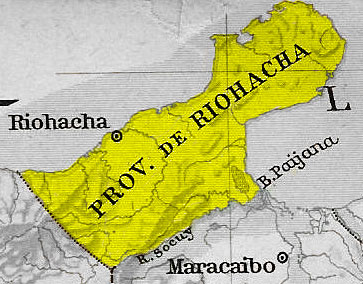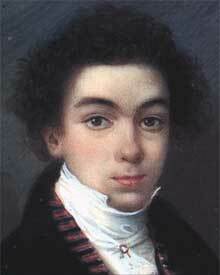|
José Ignacio De Cavero Y Cárdenas
José Ignacio de Cavero y Cárdenas (29 June 1757 – 17 August 1834) was a New Spain and Colombian lawyer and politician. A Precursor of the Independence of Colombia, as the 4th President of the Supreme Junta of Cartagena de Indias he was a signatory of the declaration of independence of the Cartagena Province from the Viceroyalty of the New Granada and the Kingdom of Spain, establishing a republic based in the concept of separation of powers, and abolishing the Tribunal of the Holy Office of the Inquisition. Cartagena would eventually join with other provinces to create the Republic of Colombia under President Simón Bolívar, and was appointed in 1824 by Vice President Francisco de Paula Santander y Omaña to serve as the 3rd Prefect Intendant of the Magdalena River and the Isthmus province, which now encompassed the former province of Cartagena as well as the provinces of Santa Marta, Riohacha, and the Isthmus. Personal life Born on 29 June 1757 in Mérida, Yucatán ... [...More Info...] [...Related Items...] OR: [Wikipedia] [Google] [Baidu] |
Francisco De Paula Santander Y Omaña
Francisco José de Paula Santander y Omaña (Villa del Rosario, Norte de Santander, Colombia, April 2, 1792 – Bogotá, Santafé de Bogotá, Colombia, May 6, 1840), was a Colombian military and political leader during the 1810–1819 independence war of the United Provinces of New Granada (present-day Colombia). He was the acting President of Gran Colombia between 1819 and 1826, and later elected by Congress as the President of the Republic of New Granada between 1832 and 1837. Santander came to be known as "The Man of the Laws" (''"El Hombre de las Leyes"'').Arismendi Posada, Ignacio; ''Gobernantes Colombianos''; trans. Colombian Presidents; Interprint Editors Ltd.; Italgraf; Segunda Edición; Page 21; Bogotá, Colombia; 1983 Biography Santander was born in Villa del Rosario, Norte de Santander, Villa del Rosario, not far from Cúcuta, on April 2, 1792. His parents were Juan Agustín Santander Colmenares who was governor of the rural province of San Faustino de los R� ... [...More Info...] [...Related Items...] OR: [Wikipedia] [Google] [Baidu] |
Republic
A republic () is a "state in which power rests with the people or their representatives; specifically a state without a monarchy" and also a "government, or system of government, of such a state." Previously, especially in the 17th and 18th centuries, the term was used to imply a state with a democratic or representative constitution (constitutional republic), but more recently it has also been used of autocratic or dictatorial states not ruled by a monarch. It is now chiefly used to denote any non-monarchical state headed by an elected or appointed president. , 159 of the world's 206 sovereign states use the word "republic" as part of their official names. Not all of these are republics in the sense of having elected governments, nor is the word "republic" used in the names of all states with elected governments. The word ''republic'' comes from the Latin term ''res publica'', which literally means "public thing", "public matter", or "public affair" and was used to refer t ... [...More Info...] [...Related Items...] OR: [Wikipedia] [Google] [Baidu] |
Colombian People Of Mexican Descent
Colombian may refer to: * Something of, from, or related to the country of Colombia * Colombians, persons from Colombia, or of Colombian descent **For more information about the Colombian people, see: *** Demographics of Colombia *** Indigenous peoples in Colombia, Native Colombians *** Colombian American ** For specific persons, see List of Colombians * Colombian Spanish, one of the languages spoken in Colombia ** See also languages of Colombia * Colombian culture * Colombian sheep, a sheep breed See also * * * Christopher Columbus (1451–1506), Italian explorer after which Colombia was named * Coffee production in Colombia * Colombia (other) * Colombiana (other) * Colombina (other) * Colombino (other) * Colombine (other) * Columbia (other) * Columbiad (other) * Columbian (other) * Columbiana (other) * Columbine (other) * Columbina (other) Columbina is a stock characte ... [...More Info...] [...Related Items...] OR: [Wikipedia] [Google] [Baidu] |
People From Mérida, Yucatán
A person ( : people) is a being that has certain capacities or attributes such as reason, morality, consciousness or self-consciousness, and being a part of a culturally established form of social relations such as kinship, ownership of property, or legal responsibility. The defining features of personhood and, consequently, what makes a person count as a person, differ widely among cultures and contexts. In addition to the question of personhood, of what makes a being count as a person to begin with, there are further questions about personal identity and self: both about what makes any particular person that particular person instead of another, and about what makes a person at one time the same person as they were or will be at another time despite any intervening changes. The plural form "people" is often used to refer to an entire nation or ethnic group (as in "a people"), and this was the original meaning of the word; it subsequently acquired its use as a plural form of per ... [...More Info...] [...Related Items...] OR: [Wikipedia] [Google] [Baidu] |
1834 Deaths
Events January–March * January – The Wilmington and Raleigh Railroad is chartered in Wilmington, North Carolina. * January 1 – Zollverein (Germany): Customs charges are abolished at borders within its member states. * January 3 – The government of Mexico imprisons Stephen F. Austin in Mexico City. * February 13 – Robert Owen organizes the Grand National Consolidated Trades Union in the United Kingdom. * March 6 – York, Upper Canada, is incorporated as Toronto. * March 11 – The United States Survey of the Coast is transferred to the Department of the Navy. * March 14 – John Herschel discovers the open cluster of stars now known as NGC 3603, observing from the Cape of Good Hope. * March 28 – Andrew Jackson is censured by the United States Congress (expunged in 1837). April–June * April 10 – The LaLaurie mansion in New Orleans burns, and Madame Marie Delphine LaLaurie flees to France. * April 14 – The Whig Party is officially named by ... [...More Info...] [...Related Items...] OR: [Wikipedia] [Google] [Baidu] |
1757 Births
Events January–March * January 2 – Seven Years' War: The British Army, under the command of Robert Clive, captures Calcutta, India. * January 5 – Robert-François Damiens makes an unsuccessful assassination attempt on Louis XV of France, who is slightly wounded by the knife attack. On March 28 Damiens is publicly executed by burning and dismemberment, the last person in France to suffer this punishment. * January 12 – Koca Ragıp Pasha becomes the new Grand Vizier of the Ottoman Empire, and administers the office for seven years until his death in 1763. * February 1 – King Louis XV of France dismisses his two most influential advisers. His Secretary of State for War, the Comte d'Argenson and the Secretary of the Navy, Jean-Baptiste de Machault d'Arnouville, are both removed from office at the urging of the King's mistress, Madame de Pompadour. * February 2 – At Versailles in France, representatives of the Russian Empire an ... [...More Info...] [...Related Items...] OR: [Wikipedia] [Google] [Baidu] |
Panamá Province
Panamá is a province of Panama. It is the location of the national capital Panama City, which also serves as the provincial capital. The governor of the province is Judy Meana, appointed by President Laurentino Cortizo and sworn in on 16 April 2020. Administrative divisions Panamá Province is now divided into 6 ''distritos'' (districts) and subdivided into 55 '' corregimientos''. The five former districts west of the Panama Canal were split off to form Panamá Oeste Province Panamá Oeste (; "West Panama" in English) is the newest province in Panama. It was created from the five districts of Panamá Province west of the Panama Canal The Panama Canal ( es, Canal de Panamá, link=no) is an artificial waterway i ... on 1 January 2014. 1 These ''corregimientos'' represent as Panama City 2 These ''corregimientos'' represent as San Miguelito City References {{DEFAULTSORT:Panama Province Provinces of Panama ... [...More Info...] [...Related Items...] OR: [Wikipedia] [Google] [Baidu] |
Riohacha Province
Riohacha Province was a province of Gran Colombia. With the 1824 changes in the subdivisions of Gran Colombia, it became part of Magdalena Department. Riohacha (Spanish pronunciation: joˈa.tʃa Wayuu: Süchiimma , is a city in the Riohacha Municipality in the northern Caribbean Region of Colombia by the mouth of the Ranchería River and the Caribbean Sea. Riohacha is the capital city of La Guajira Department La Guajira () is a department of Colombia. It occupies most of the Guajira Peninsula in the northeast region of the country, on the Caribbean Sea and bordering Venezuela, at the northernmost tip of South America. The capital city of the departm .... Provinces of Gran Colombia Provinces of the Republic of New Granada {{Colombia-geo-stub ... [...More Info...] [...Related Items...] OR: [Wikipedia] [Google] [Baidu] |
Intendant
An intendant (; pt, intendente ; es, intendente ) was, and sometimes still is, a public official, especially in France, Spain, Portugal, and Latin America. The intendancy system was a centralizing administrative system developed in France. In the War of the Spanish Succession of 1701 to 1714 the French royal House of Bourbon secured its hold on the throne of Spain; it extended a French-style intendancy system to Spain and Portugal - and subsequently worldwide through the Spanish Empire and Portuguese Empire. Regions were divided into districts, each administered by an intendant. The title continues in use in Spain and in parts of Spanish America for particular government officials. Development of the system in France Intendants were royal civil servants in France under the Old Regime. A product of the centralization policies of the French crown, intendants were appointed "commissions," and not purchasable hereditary "offices," which thus prevented the abuse of sales of royal ... [...More Info...] [...Related Items...] OR: [Wikipedia] [Google] [Baidu] |
Prefect
Prefect (from the Latin ''praefectus'', substantive adjectival form of ''praeficere'': "put in front", meaning in charge) is a magisterial title of varying definition, but essentially refers to the leader of an administrative area. A prefect's office, department, or area of control is called a prefecture, but in various post-Roman empire cases there is a prefect without a prefecture or ''vice versa''. The words "prefect" and "prefecture" are also used, more or less conventionally, to render analogous words in other languages, especially Romance languages. Ancient Rome ''Praefectus'' was the formal title of many, fairly low to high-ranking officials in ancient Rome, whose authority was not embodied in their person (as it was with elected Magistrates) but conferred by delegation from a higher authority. They did have some authority in their prefecture such as controlling prisons and in civil administration. Feudal times Especially in Medieval Latin, ''præfectus'' was used to r ... [...More Info...] [...Related Items...] OR: [Wikipedia] [Google] [Baidu] |
Simón Bolívar
Simón José Antonio de la Santísima Trinidad Bolívar y Palacios (24 July 1783 – 17 December 1830) was a Venezuelan military and political leader who led what are currently the countries of Colombia, Venezuela, Ecuador, Peru, Panama and Bolivia to independence from the Spanish Empire. He is known colloquially as '' El Libertador'', or the ''Liberator of America''. Simón Bolívar was born in Caracas in the Captaincy General of Venezuela into a wealthy criollo family. Before he turned ten, he lost both parents and lived in several households. Bolívar was educated abroad and lived in Spain, as was common for men of upper-class families in his day. While living in Madrid from 1800 to 1802, he was introduced to Enlightenment philosophy and met his future wife María Teresa Rodríguez del Toro y Alaysa. After returning to Venezuela, in 1803 del Toro contracted yellow fever and died. From 1803 to 1805, Bolívar embarked on a grand tour that ended in Rome, where he swore to end ... [...More Info...] [...Related Items...] OR: [Wikipedia] [Google] [Baidu] |

_1938.jpg)




